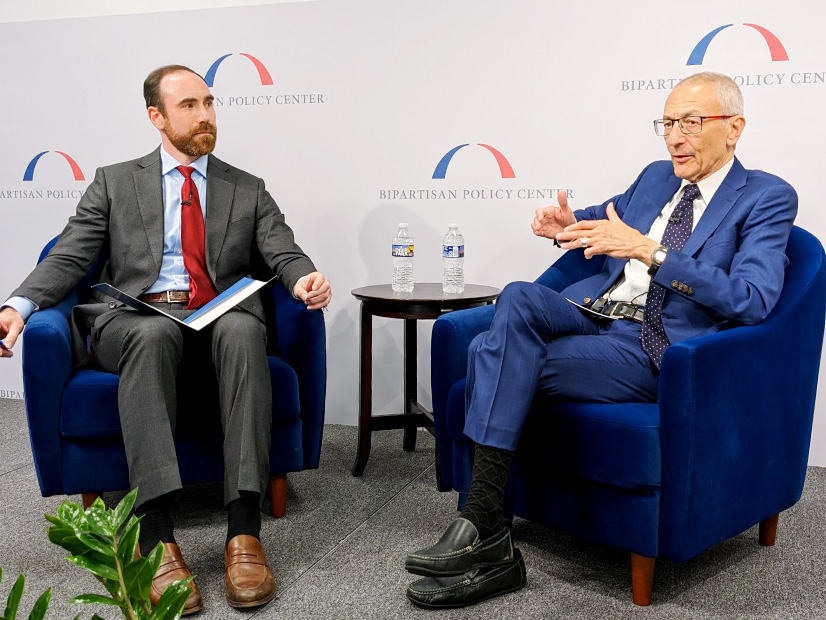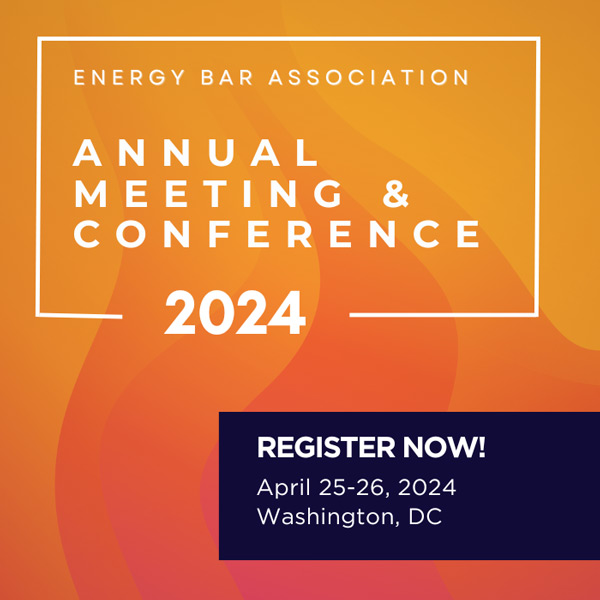
WASHINGTON ― President Biden may not agree with all the provisions of Sen. Joe Manchin’s (D-W.Va.) bill to accelerate permitting of energy and transmission projects, but he will support it “to start serious bipartisan negotiations in the Senate,” according to White House Senior Adviser John Podesta.
“The President doesn’t love everything in the bill, but we support it,” Podesta told a small audience Wednesday at the Bipartisan Policy Center. “That’s what compromise means, and it will take compromise by everybody to get this done.”
Podesta was acting as advance man for a new fact sheet from the White House outlining Biden’s top priorities for “permitting reform,” as the issue is commonly referred to. Describing current permitting delays and bottlenecks as “pervasive at every level of government,” Podesta said, “We got so good at stopping projects that we forgot how to build things in America.”
Permitting for projects he had worked on during the administration of former president Barack Obama had still not been approved when he returned to government last year, Podesta said. “That’s unacceptable.”
While highlighting administration actions — such as Tuesday’s release of proposals for designating National Interest Electric Transmission Corridors — deeper and more basic changes will require congressional action, he said. (See DOE Rolls out New Process for Designating Key Transmission Corridors.)
In his summary of top-line points in the fact sheet, Podesta put speeding up interconnection at the head of the list. A recent report from the Lawrence Berkeley National Laboratory found more than 2,000 GW of wind, solar and storage sitting in interconnection queues across the country.
“We’ve got to get more clean energy capacity connected to the grid,” he said. “Legislation needs to expedite the connection of generation or storage that impacts more than one transmission system, and it needs to allow clean energy project developers to pay the cost of interconnection upfront.”
On interstate transmission, the administration wants permitting to be faster, more efficient and predictable. “A key part of this is allowing developers to allocate project costs to customers that benefit from the new transmission,” Podesta said.
To prevent power outages during extreme weather events, the administration wants to expand energy transfers between grid operators. Congress should give FERC the authority “to set a minimum level of transfer capability between regional grids — and should require the consideration of multiple benefits, including economic, operational, and environmental, when making transmission decisions,” he said.
In addition, “Congress should give FERC clear authority to issue permits for interstate transmission lines … and to include carbon dioxide and hydrogen infrastructure in designated energy corridors,” Podesta said.
Other priorities set out in the administration fact sheet include:
- Improved permitting of clean energy projects on public lands through the use of programmatic environmental reviews, which cover specific areas or regions. Such reviews could “allow environmental review work to be re-used for multiple projects — by authorizing agencies to impose a fee on project sponsors to cover costs associated with a programmatic review upon which their project relies.” These reviews could then be used for up to five years or longer to expedite permitting of projects in the programmatic review area.
- Expanded use of categorical exclusions for clean energy projects. About 95% of projects on federal land get these exclusions, meaning they do not require an environmental review under the National Environmental Policy Act (NEPA).
- Development of “an automated, joint electronic permit application for federal agencies,” along with “automated workflow tools that are compatible with existing agency dashboards” and can track a project’s progress from application to approval.
- Improved community engagement. The White House wants federal agencies to each have a dedicated chief community engagement officer who will oversee engagement efforts across permitting processes. Agencies would also establish community engagement funds to help local and tribal entities who might not have the resources or expertise to engage in federal permitting processes. Fees from project developers could be used to contribute to these funds.
- Modernized mining laws. The law governing mining on federal lands was signed in 1872 by President Ulysses S. Grant and has remained largely unchanged since then, Podesta said. While the administration has yet to develop detailed proposals, the fact sheet calls for reforms that “set a global standard for responsible mineral development and … increase coordination, transparency and communication between federal agencies, and provide greater certainty for project sponsors for responsible domestic mining and extraction.”
‘No More Climate Denial’
The administration’s focus on permitting appears strategically timed as Congress gears up for action on the issue. House Republicans have tied permitting reform to the increasingly tense debt ceiling negotiations, with the inclusion of their energy bill, H.R. 1, in the debt ceiling package they passed April 26. Permitting reform provisions in that bill were almost exclusively focused on streamlining permitting and removing other obstacles to the development of fossil fuel projects. (See GOP Energy Bill Passes House, Heads for Hostile Senate.)
Podesta slammed the debt ceiling bill, saying it be “would be catastrophic for our economy, our energy security and our national security. They are proposing to endanger the health of Americans [and] undo our clean energy progress as ransom for not triggering a catastrophic default,” he said.
Any chance for bipartisan action on permitting now lies in the Senate, where the issue is on the agendas of both the Energy and Natural Resources (ENR) Committee, chaired by Manchin, and the Environment and Public Works (EPW) Committee.
At EPW’s recent hearing on permitting, both Chair Tom Carper (D-Del.) and Ranking Member Shelley Moore Capito (R-W.Va.) called for a “regular order” of hearings and bipartisan negotiations on the issue. (See Permitting Delays, Inflation Put Double Whammy on IIJA and IRA.)
Manchin and ENR have a hearing on permitting on Thursday, when bills from both Manchin and Ranking Member Sen. John Barrasso (R-Wyo.) will likely be on the table.
Manchin has reintroduced the Building American Energy Security Act, which failed to gain a majority vote in the previous Congress, but continues to have Biden’s support. While Manchin and the White House have had a falling out over implementation of the Inflation Reduction Act’s electric vehicle tax credits, permitting may allow some rebuilding of the relationship, with Podesta praising the senator’s “leadership and commitment to this issue in particular.”
The bill sets a two-year limit on environmental impact reviews for major projects and one year for projects needing a lower-level environmental assessment. It also calls for the White House to identify a list of 25 high-priority energy infrastructure projects, to be updated periodically, and expedite permitting on them.
Similar to H.R. 1, Barrasso’s Spur Permitting of Underdeveloped Resources Act has a strong focus on promoting oil and gas leasing. The bill would require the Secretary of the Interior to immediately resume quarterly onshore oil and gas lease sales and “offer no less than 25% of all nominated parcels in each field office at every quarterly sale.”
It also calls for no fewer than 11 offshore oil and gas lease sales in the Gulf of Mexico and offshore Alaska over the next five years.
Capito’s permitting reform effort is the tongue-twisting Revitalizing the Economy by Simplifying Timelines and Assuring Regulatory Transparency Act, which is chiefly aimed at undercutting NEPA and the Clean Water and Clean Air acts. For example, it proposes a two-year time limit for environmental impact reviews under NEPA, but if the deadline is not met, a project would be considered to have met the requirements of the law.
By comparison, in Manchin’s bill, if an agency misses a permitting deadline, project developers could seek a court order “directing agencies to finish the review.”
With Republicans’ focus on fossil fuels and Biden’s on clean energy, common ground may be hard to find. Podesta sees possibilities for compromise on both sides’ proposals for limiting the time allowed for environmental reviews and other efforts to simplify the permitting process.
“There’s room for discussion on those core common elements,” he said. “But the one thing I think we’re going to insist on is no more climate denial; no more looking the other way. No more you can’t analyze the climate effects of a project. No more we need to ensure that we’re only looking at the cost benefits over a short period of time because if we look over the horizon, we might find that the world is changing a little faster than we thought.”
“Right now, we’re in the midst of a climate crisis, one that demands that we build, build, build clean energy,” Podesta said. “Here’s the bottom line: If we can’t build some new things in a few backyards, the climate crisis will destroy everyone’s backyards, along with the livelihoods, communities, wildlife and biodiversity we all want to protect.”

